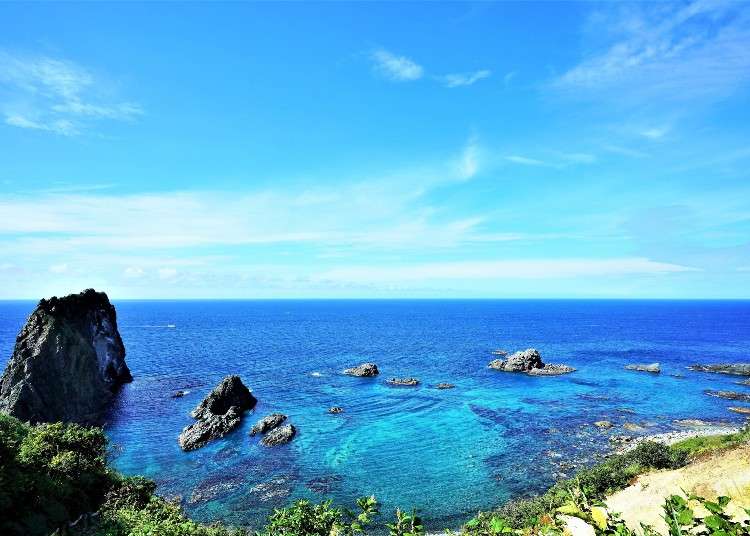
7 Spectacular Hokkaido Summer Spots to Put on Your Must-Visit List
- Written by: Minna no Kotoba Sha
Embark on a remarkable journey through Hokkaido's enchanting summer spots, where Japan's northernmost prefecture unveils its vast and captivating landscapes. Covering a quarter of the country's landmass, Hokkaido is a treasure trove of natural wonders that set it apart from the mainland.
As the summer season unfolds, this region blossoms into a breathtaking tapestry of sights and experiences, beckoning travelers from near and far. Get ready to immerse yourself in the unparalleled beauty and charm that await in Hokkaido's most alluring destinations.
- Table of Contents
-
- 1. Shiretoko from the sea: Splendid nature from a unique point of view
- 2. Path of White Shells: From Wakkanai into the sea
- 3. Cape Kamui: Picturesque pigments from the Shakotan Sea
- 4. Lake Shikotsu: A fantasy-like lake of vibrant hues
- 5. Lavender Fields of Furano: The epitome of picture-perfect!
- 6. Hokuryu Sunflower Village: Slopes upon slopes of cheerful yellow!
- 7. The Gardens of Tokachi: Art in formations
1. Shiretoko from the sea: Splendid nature from a unique point of view

Let's begin our journey from the sea of Shiretoko. The peninsula was registered as a UNESCO World Heritage Site in 2005 due to its unique ecosystem is a result of having flora and fauna from the area's land, rivers, and sea closely interlinked with one another.
Shiretoko Peninsula is located on the eastern edge of Hokkaido. It is home to many rare plants and animals - some of which are endangered - and the natural landscape here changes appearances during each of the four seasons.
The abundance of wildlife available for observation here throughout the year has continued to captivate the attention of many nature-lovers from around the world.
Getting to Shiretoko
The fastest way to get to Shiretoko is via airplane. Memanbetsu Airport is the airport nearest to Shiretoko. A flight there from Shin-Chitose would take about 45 minutes. After that, it's a two-hour drive from Memanbetsu Airport to Utoro, the harbor town of Shiretoko.
If you intend to travel by train, the nearest station to the peninsula is Shiretokoshari Station on the JR Lines, where you can then drive or transfer to a bus that will take you to Utoro. The journey should take about one hour.
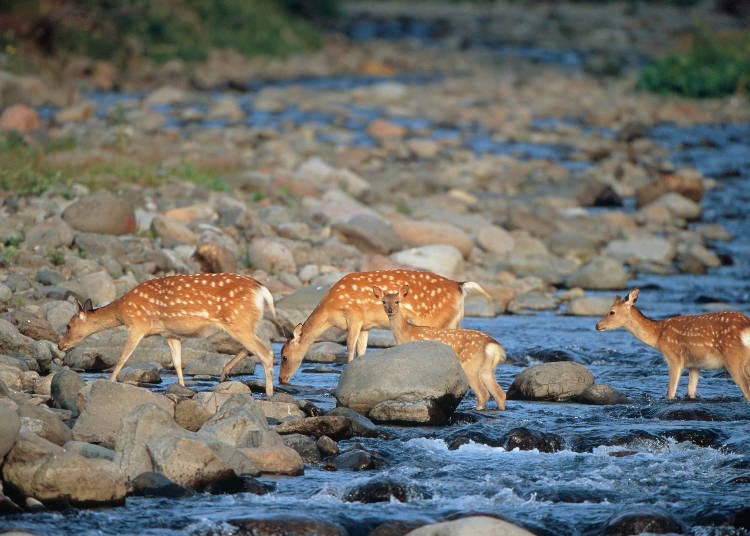
Scenic spots abound in Shiretoko all year round, but if you'll be visiting during summer, the one activity you absolutely must try is the cruise ship tour that will take you around the peninsula on water.
Where else can you feel the breeze on your face as you take in the sights from the sea? From aboard the ship, you'll be able to see sheer cliffs and waterfalls that aren't visible from inland.
On good days, there may even be a bear or two frolicking around along the coastline! There are a few cruise operators in the area visitors can choose from, but note that each company offers a different level of multilingual support.
To make the most of your tour, do contact the company for more information before booking tickets.
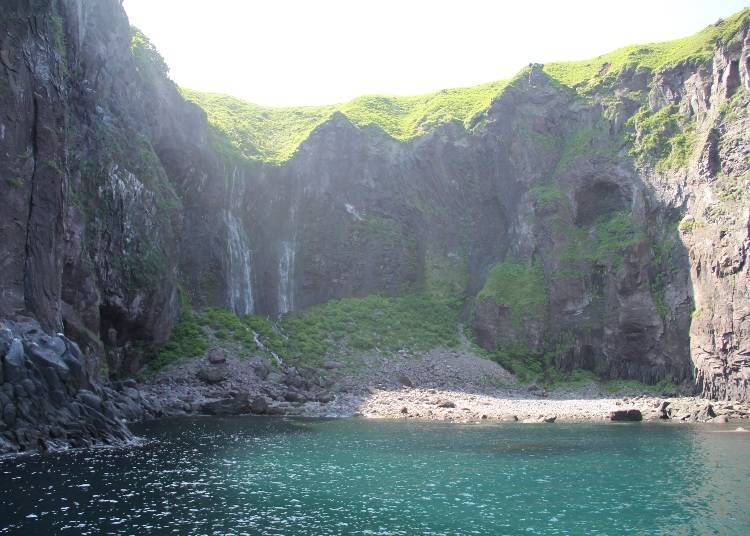
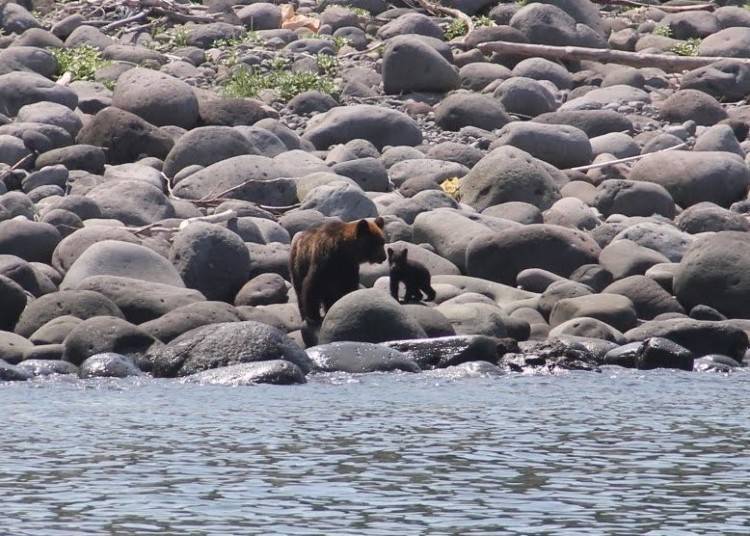
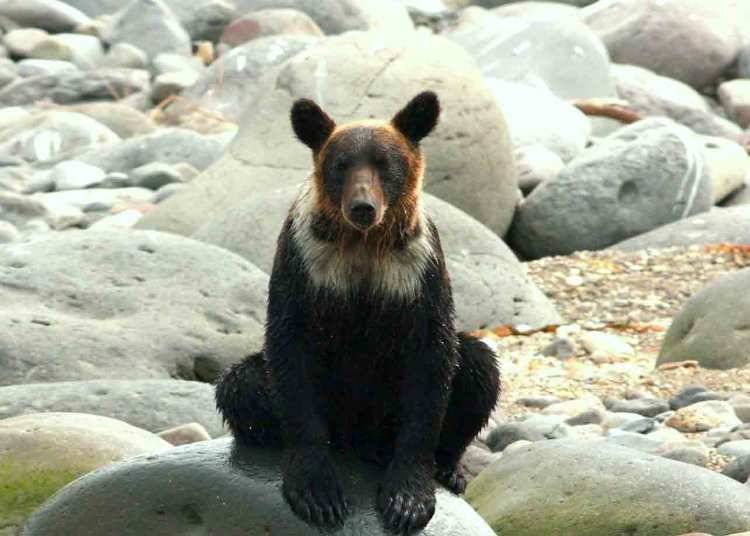
Right at the tip of the peninsula is the beautiful Cape Shiretoko which is inaccessible via regular roads and only visible from a ship! This will be one of the cruise highlights, and if you're lucky, you may encounter dolphins or whales swimming along leisurely. The rare Stellar's sea eagle is another wildlife sighting to watch out for.
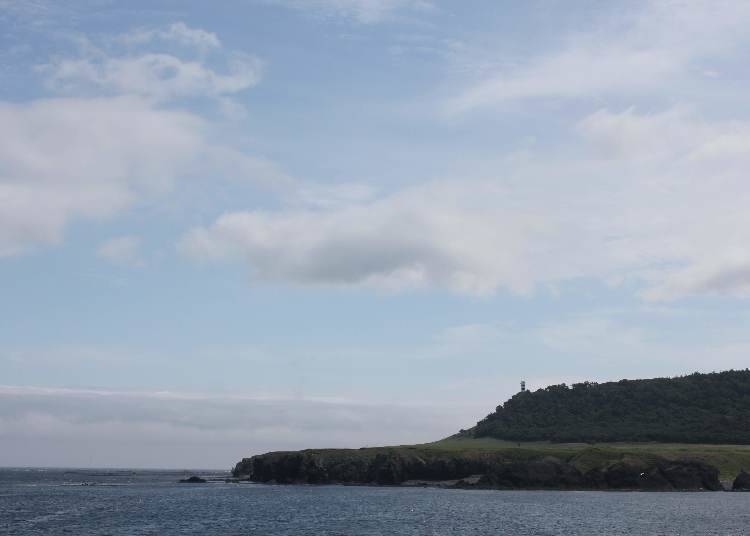
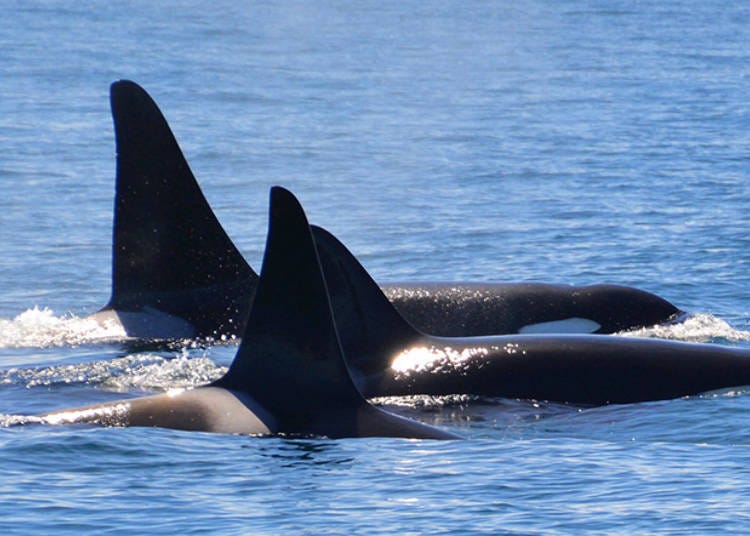
Shiretoko is chock-full of amazing natural sights overland as well. Some must-visit spots include the remote but beautiful Shiretoko Five Lakes situated in the middle of a primitive forest and the famous Yuhidai platform that's one of the top spots in the area for watching sunsets.
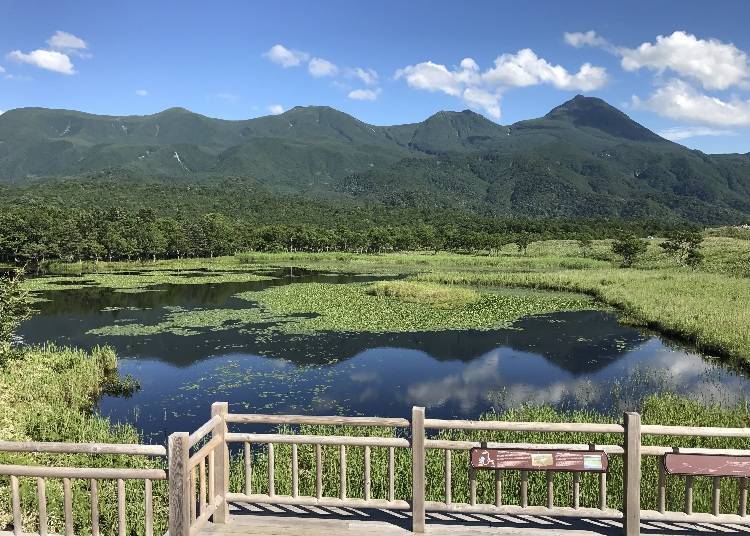
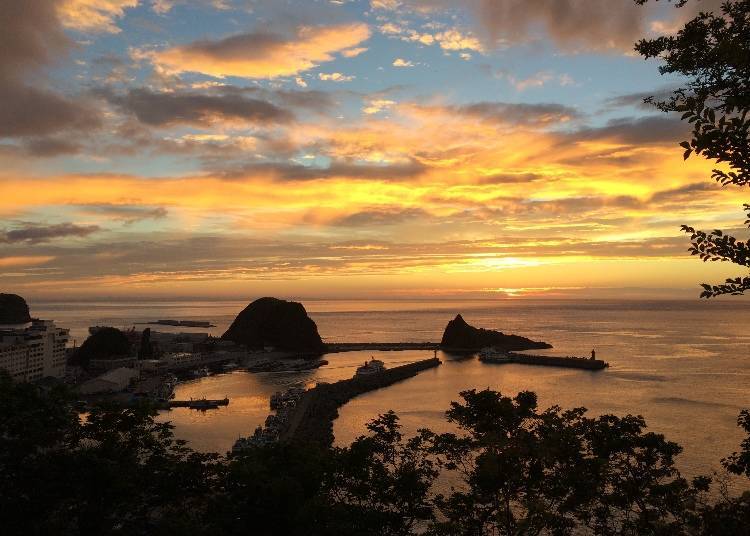
To complete your scenic tour, sit down at one of Utoro Town's local restaurants for a satisfying meal of freshly harvested seafood! Shops found in the roadside rest area Utoro-Shirietoku are also selling a wide range of merchandise, including processed seafood products and local craftwork - perfect for those looking to bring home a unique souvenir or two.
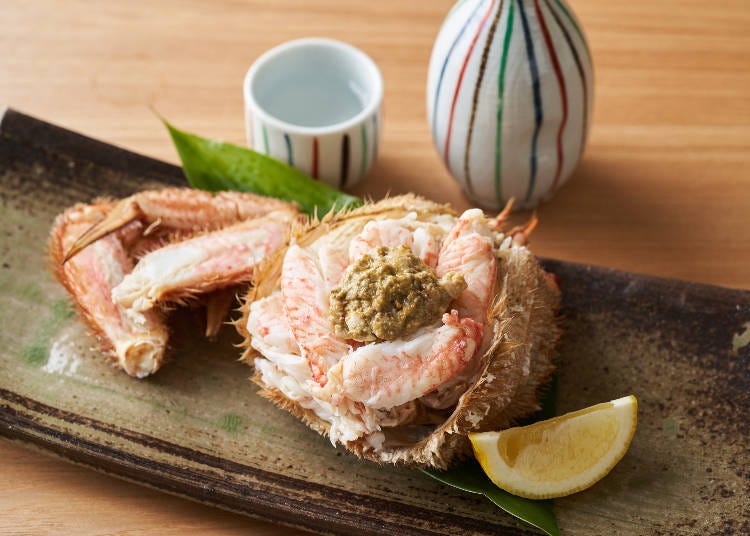
-

-
Address
Rausu-cho, Menashi-gun, Hokkaido and Shari-cho, Shari-gun, 099-4100
View Map -
Nearest Station
Shiretoko-Shari Station (Senmo Main Line)
- Phone Number 015-432-7500
-
Address
Rausu-cho, Menashi-gun, Hokkaido and Shari-cho, Shari-gun, 099-4100
2. Path of White Shells: From Wakkanai into the sea

The Path of White Shells is an interesting part of a long footpath that can be found in Wakkanai, the northernmost city of Hokkaido, and it starts at the three kilometers (1.8 miles) mark just before the end of the path.
Depending on where you're standing as you look at this path, it may even seem to be leading you directly into the sea!
Pictures of this highly intriguing view have caused a stir on social media and turned this path one of the most popular attractions of Wakkanai as a result.
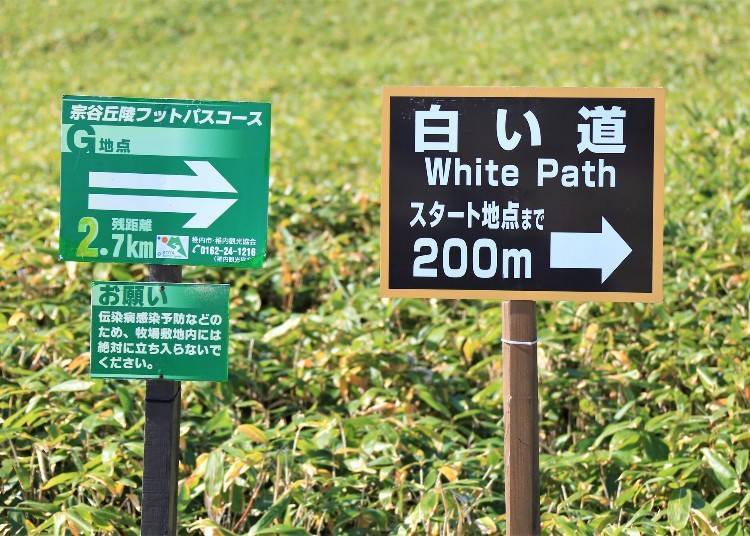
The nearest train station is Wakkanai Station on the JR Lines, and you can reach the path by driving or taking a bus from the station.
For those taking a bus, hop on a Soya Bus from the station and drop off at the Soyamisaki Bus Stop in about 50 minutes. You'll then have to walk for about two hours on a connected footpath to arrive at the Path of White Shells proper.
Driving to this location from Wakkanai Station will take about one hour, as the route is slightly complicated. Be sure to check the access guide posted on Wakkanai City's official homepage's tourism section to see some video and pictorial guides on how to get there. There will also be signposts along the way.
Wakkanai City's homepage is available in Japanese, English, Traditional Chinese, Simplified Chinese, Korean, and Russian.
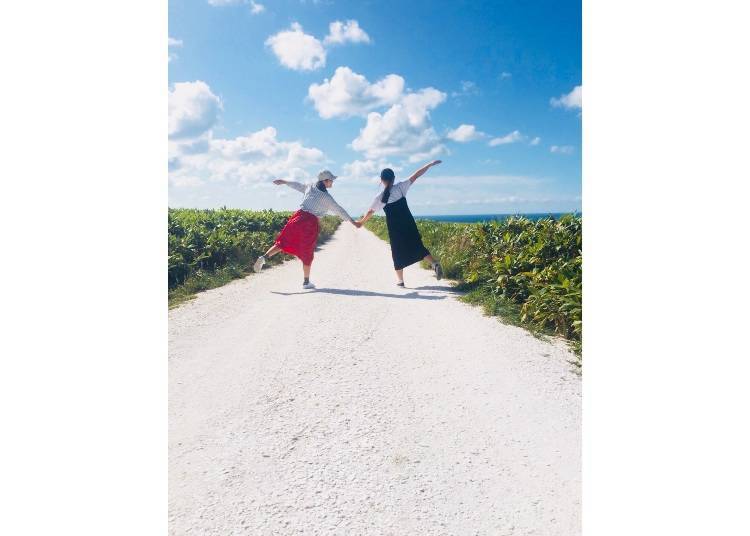
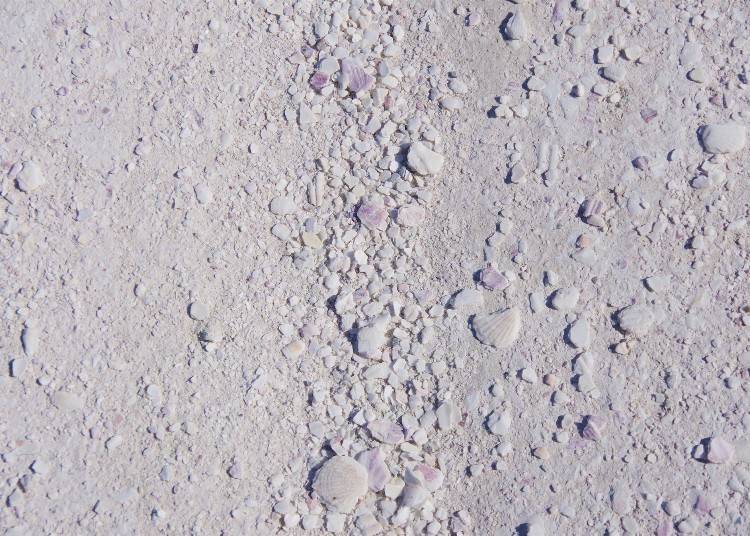
You may be wondering, how did the path come to be so white? This has to do with the scallop shells carpeting the road.
Wakkanai City is surrounded by the sea and has an abundance of marine resources available to it. One of the city's signature seafood is the soya scallop. The sweet and juicy flesh packed with tasty umami is often served for meals in town, but for many years, the shells that get left behind would be thrown out as they served no practical purpose.
City staff came up with a way to reuse them in an environmentally friendly manner by spreading the crushed shells over a part of the footpath here. This was how the Path of White Shells was born.
One of the highlights of the landscape here is the view of Cape Soya Wind Farm, a large area containing 57 massive windmills. On fair weather days, you may even be able to catch sight of Sakhalin Island or Rishiri Island's Rishirifuji mountain in the distance.
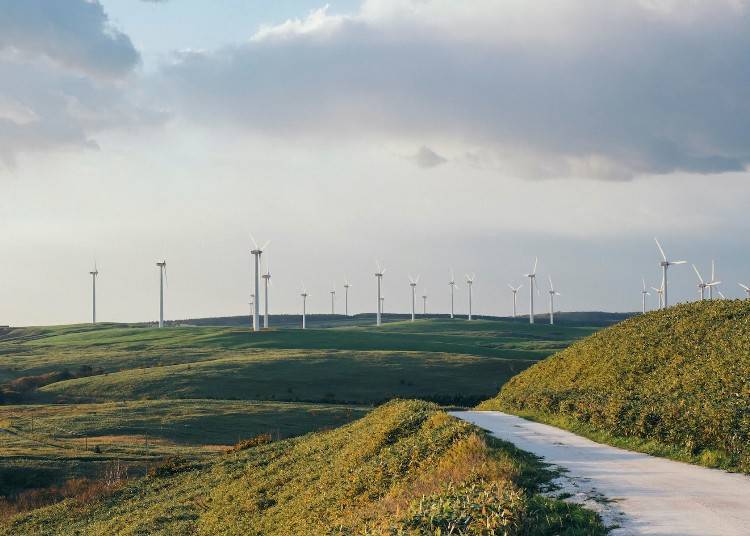
You can also cycle down the Path of White Shells by renting a bicycle from the Wakkanai Sight Seeing Information Center, available from late April to October.
Take your pick from regular bicycles, electric bicycles, or mountain bikes that are especially suitable for traveling long distances!
While the path is accessible to cars and motorcycles as well, be careful to drive slowly and look out for pedestrians and oncoming traffic, as the road is very narrow.
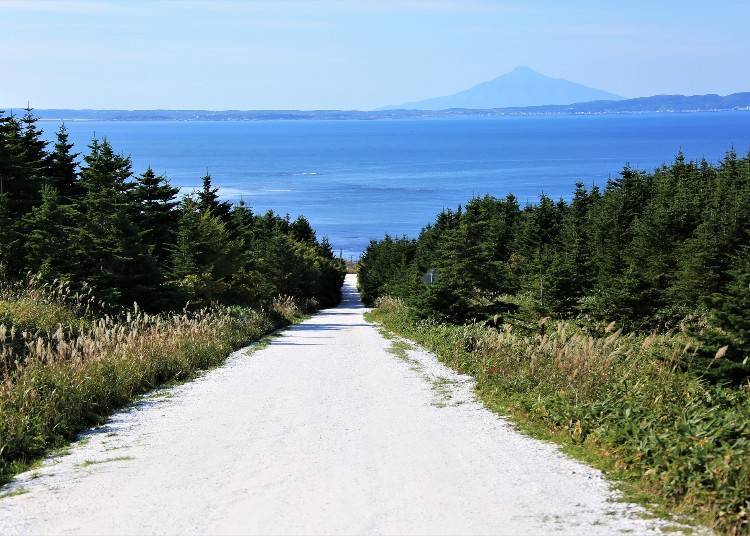
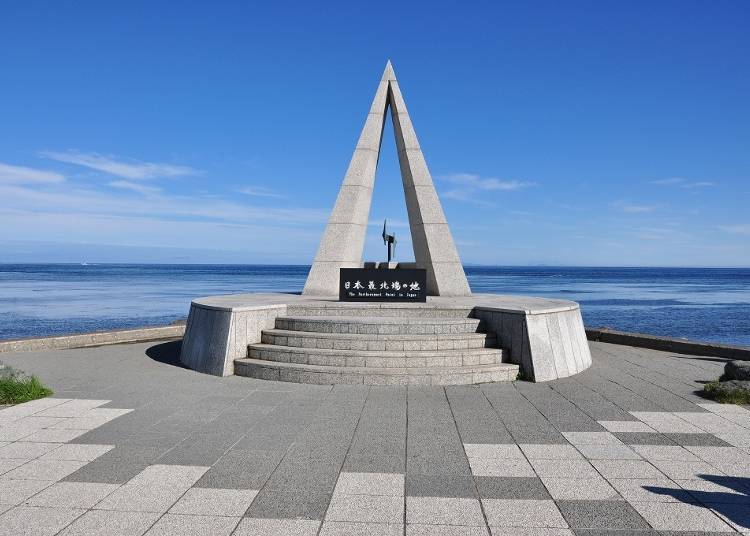
The Path of White Shells isn't the only photogenic hotspot in Wakkanai City either. Right at the edge of Cape Soya stands a monument that is Japan's northernmost landmark.
As you can guess, this a very popular place for photo-taking as well. There's also Cape Noshappu, a place to enjoy a lovely view of the sun slowly sinking into the horizon on days with clear skies.
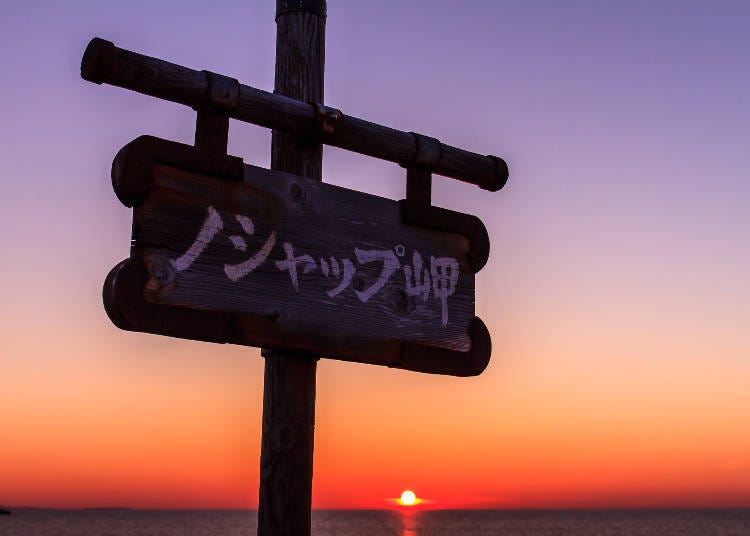
The Wakkanai North Breakwater Dome is an interesting structure with a unique semi-arc roof supported by 70 strong pillars. Entry is free for all, and the impressive building is a sight that will stay with you for a quite while!
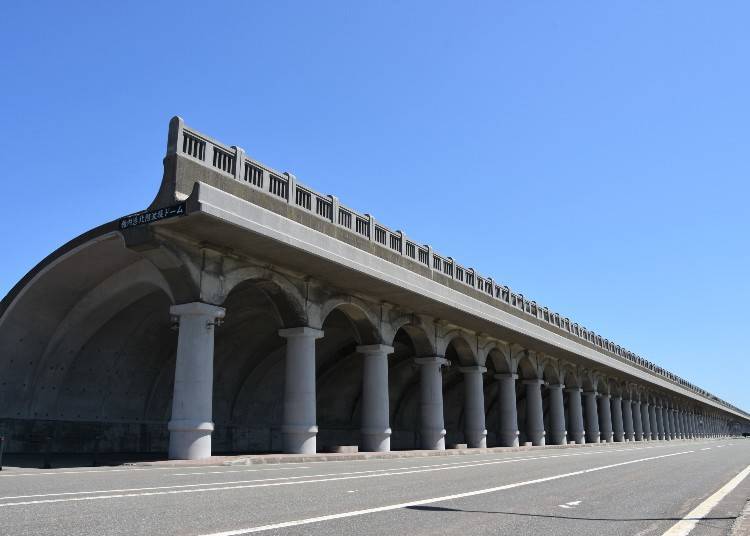
Recommended hotels in Wakkanai near the Path of White Shells
-
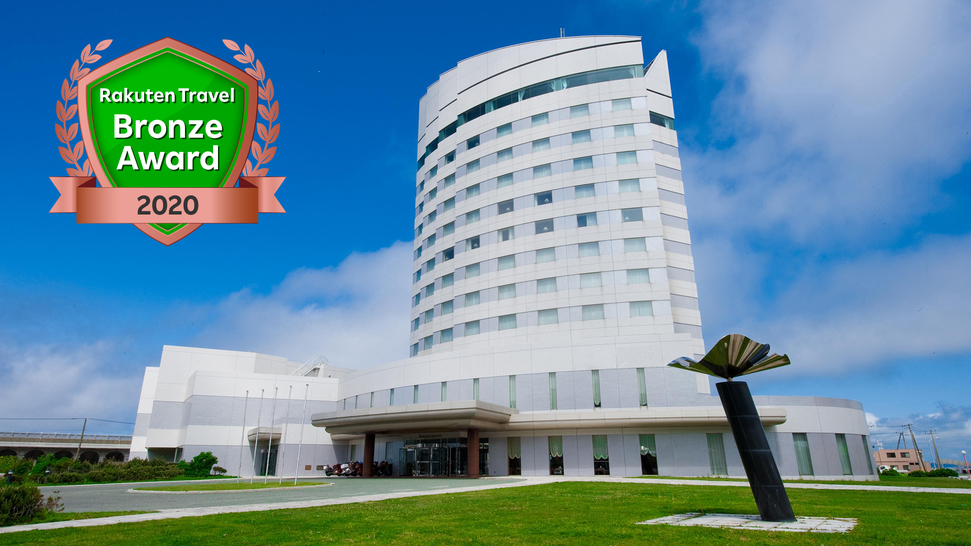 Surfeel Hotel Wakkanaiサフィールホテル稚内
Surfeel Hotel Wakkanaiサフィールホテル稚内- Address 1-2-2 Kaiun, Wakkanai-shi, Hokkaido View Map
- Original source: Rakuten Travel
-
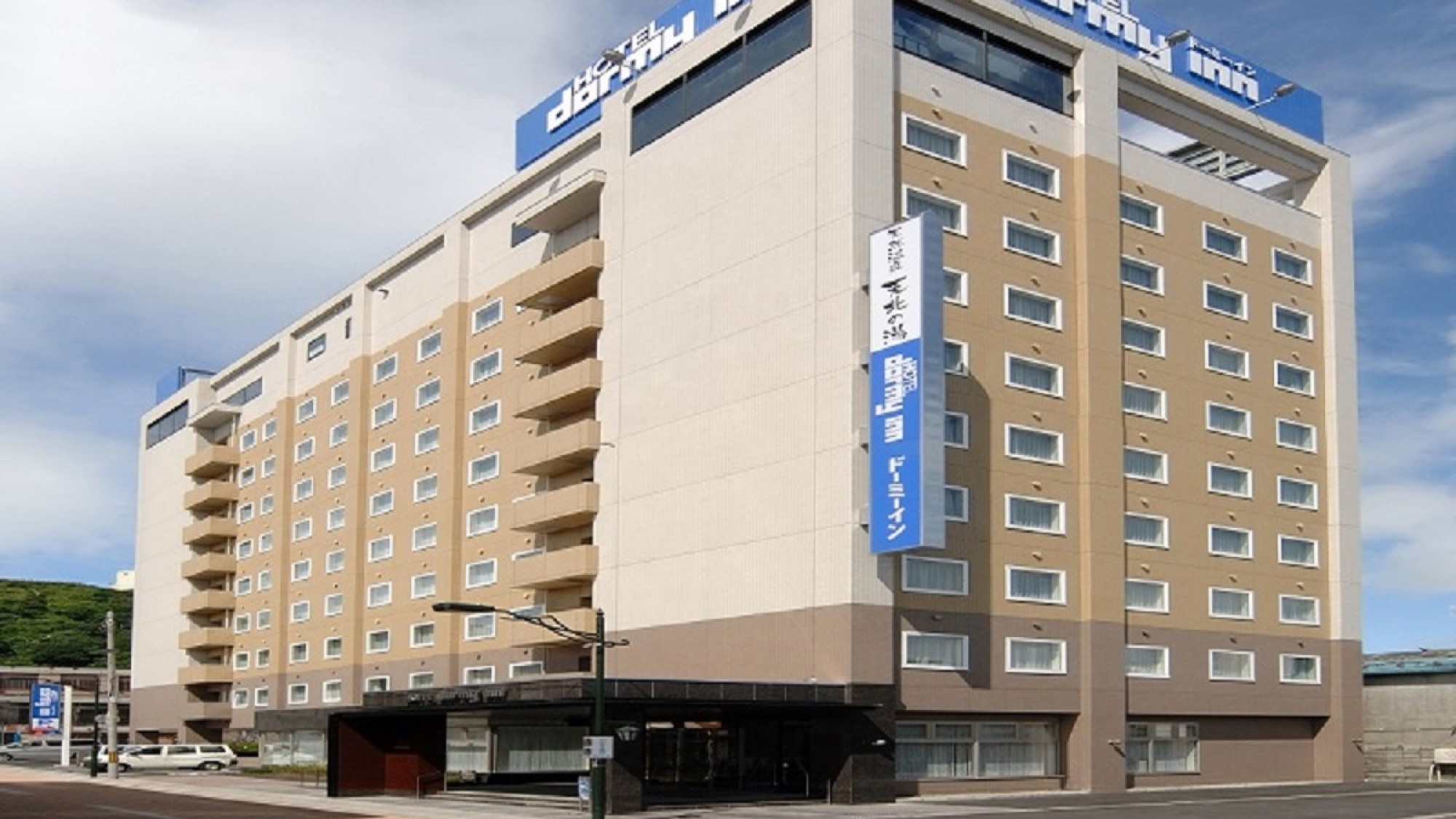 Dormy Inn Wakkanai天然温泉 天北の湯 ドーミーイン稚内
Dormy Inn Wakkanai天然温泉 天北の湯 ドーミーイン稚内- Address 2-7-13 Chuo, Wakkanai-shi, Hokkaido View Map
- Original source: Rakuten Travel
-
Path of White Shells白い道
- Address Soya Soyamura, Wakkanai, Hokkaido 097-0000
3. Cape Kamui: Picturesque pigments from the Shakotan Sea
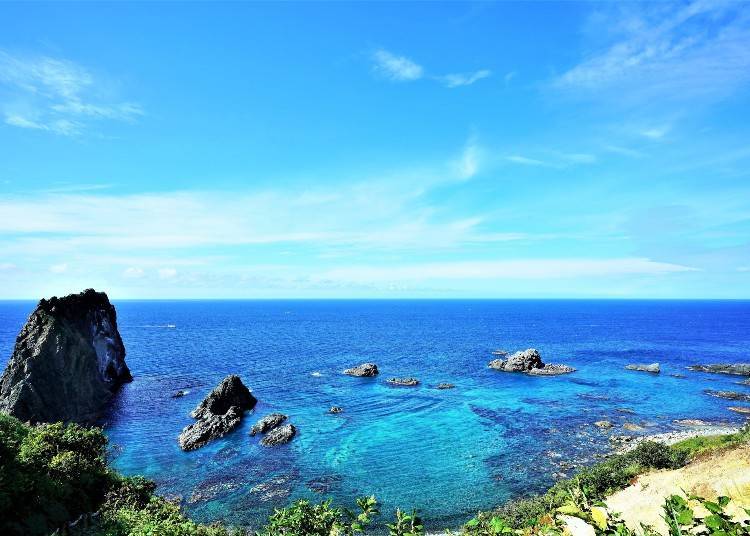
The Shakotan Peninsula, once a prosperous herring fishing ground, is located in the northwestern part of Hokkaido. It is considered one of Japan's quasi-national parks and the Shakotan Sea has been designated as a national marine park as well - the only such place in Hokkaido on the list!
There are a number of viewpoints visitors can use to look out at the scenic waters. During summertime, the area comes alive with much activity from excited tourists and outdoor campers.
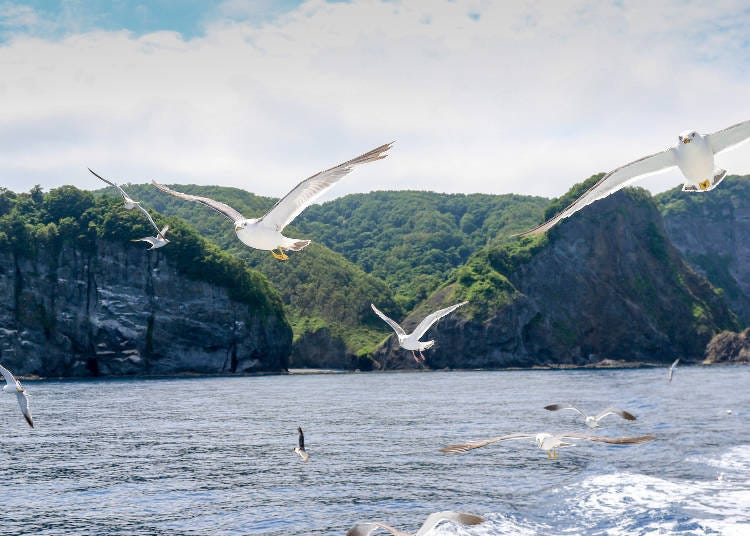
One of the best places to see the stunning view the place offers is Cape Kamui, situated right at the edge of the peninsula.
There's a 30-minute walking trail that leads visitors to the tip of the cape from around its edge line. From there, you'll be able to gaze at the sea and its bright blue hues, affectionately known as Shakotan Blue, along with the majestic-looking cliffs in the area.
To get to Cape Kamui using public transport, take an express bus or shuttle bus from Otaru Station on the JR Lines and stop at Kamuimisaki Bus Stop. The trip will take about two hours on an express bus.
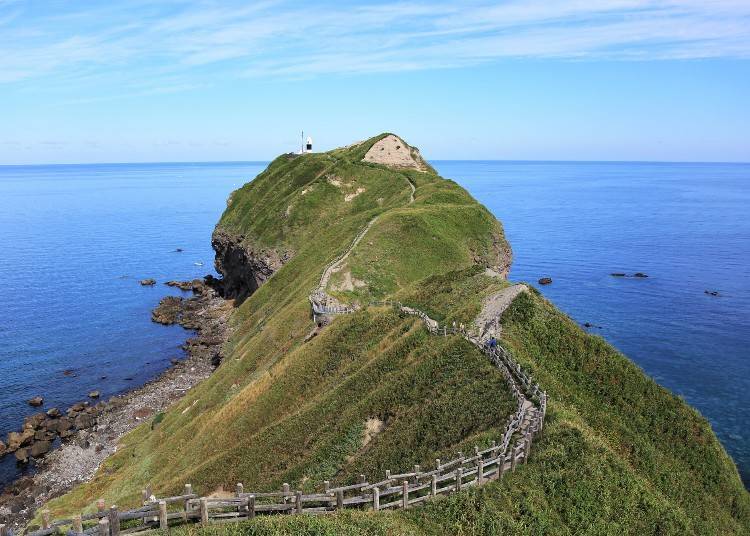
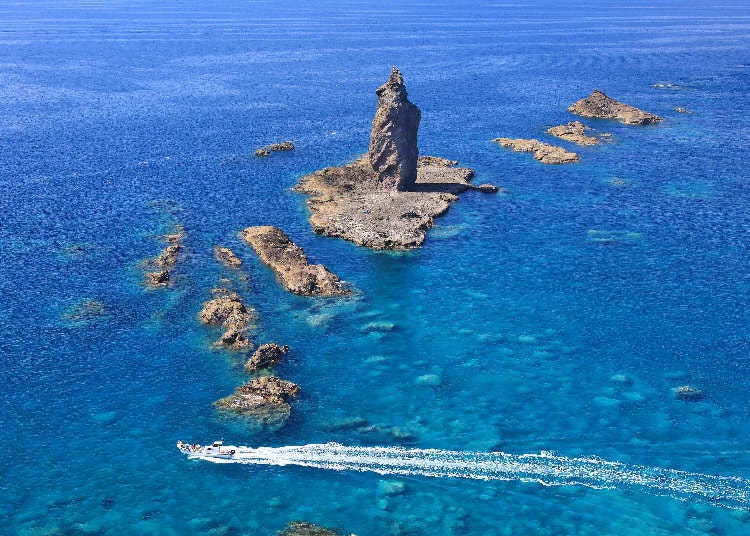
To get even closer to the sea, consider taking a cruise ship such as the New Shakotan, an observatory ship where you can admire marine life underwater from the ship's bottom, or stay on deck to catch sight of the cape's stunning landscape from a unique viewpoint from the sea.
Although the ship is not operated by staff who can speak foreign languages, there are English information pamphlets and signage available at the pier for the convenience of international visitors.
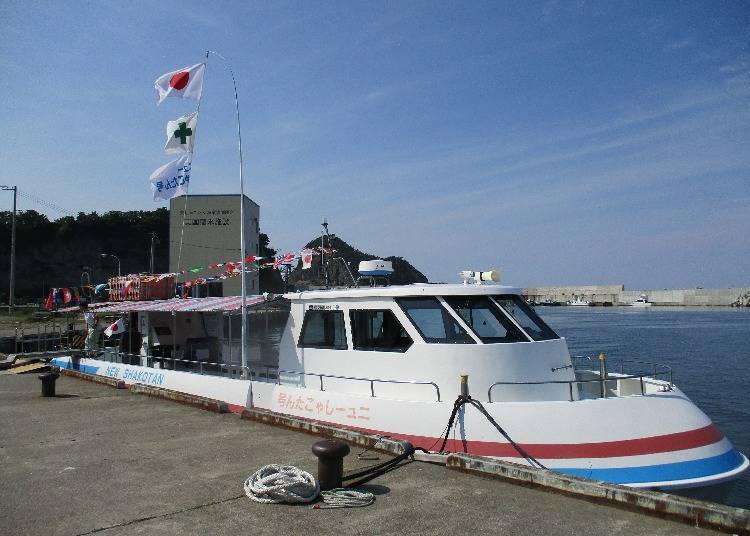
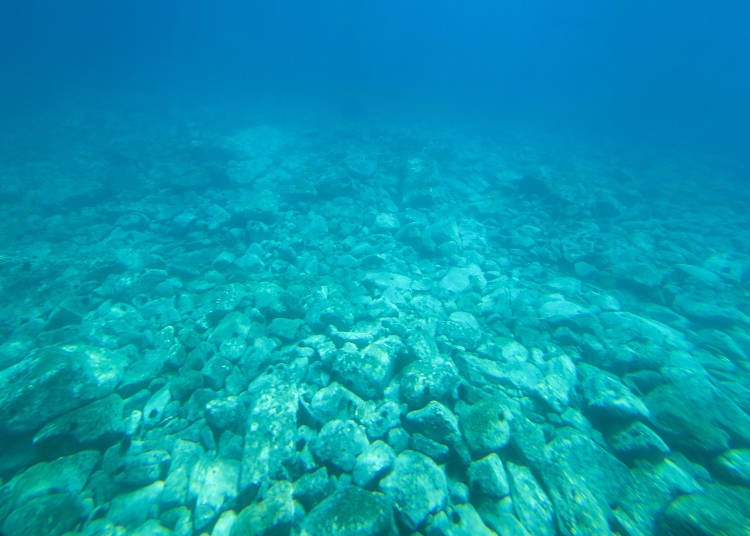
There are plenty of other noteworthy scenic spots along the coastline of Shakotan Peninsula as well, such as the Shimamui Coast and Cape Ogon.
During early summer, flowers of Hokkaido, such as the ezo kanzou from the lily family, will be in full bloom here, brightening up the already beautiful scene here and adding color and vibrancy to it. The best way to enjoy the sight of these flowers is to go for a drive around the area!
If you are driving, don't forget to head down what is known as the Nihon Kaioi Soran Line, a combination of national routes 228 and 229 that links Otaru to Hakodate along the Shakotan Peninsula coast. That means you'll be driving alongside an invigorating view of the sea most of the time!
The distance is about 490 kilometers (304 miles), so you'll probably need to plan to be on the road for an entire day. For maximum enjoyment, try to include a few short breaks in between or stay in a hotel along the route overnight to freshen up before restarting the journey.
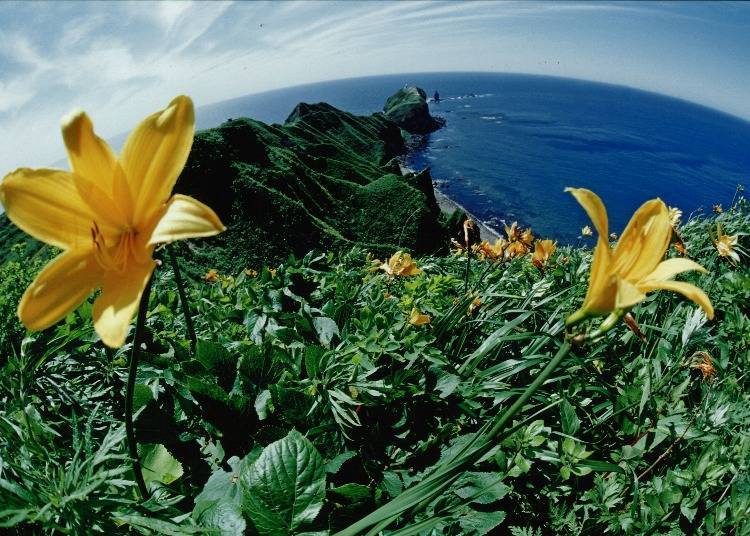
There are plenty of other things to look forward to in Shakotan Peninsula during summer as well, such as the delicious seafood!
In June, the embargo on sea urchin harvesting is lifted, so visitors can look forward to enjoying the freshest urchin haul between June and August.
You can be sure that these Hokkaido sea urchins that grew up on a rich and varied Shakotan sea diet will taste absolutely wonderful. No wonder many people make a special visit to the area to have a full and satisfying meal of "Urchin Rice Bowl" and other delicacies during this period!

Another thing to look out for is the hot springs! Just a quick 10-minute drive to the east of Cape Kamui is the hot spring spa Misaki no Yu Onsen, which features an outdoor bath and indoor bath with windows facing the sea.
On clear days, visitors will be able to catch a glimpse of Cape Kamui as they soak in the bath, or watch the sky and sea get painted over with a beautiful orange glow during sunset.
Great views, delicious food, and relaxing hot springs to boot. It looks like Shakotan has everything a leisure traveler could ever ask for and more! Now you know why people say it's one of those places in Hokkaido that you have to visit at least once!
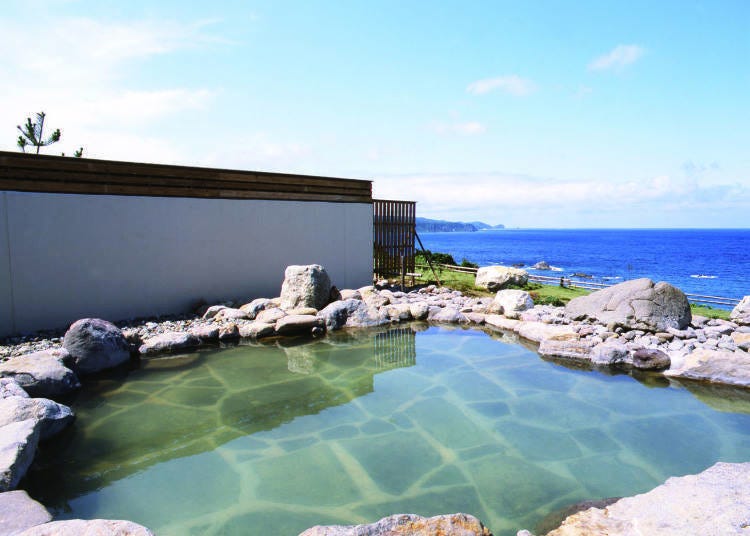
Recommended hotels near Cape Kamui
-
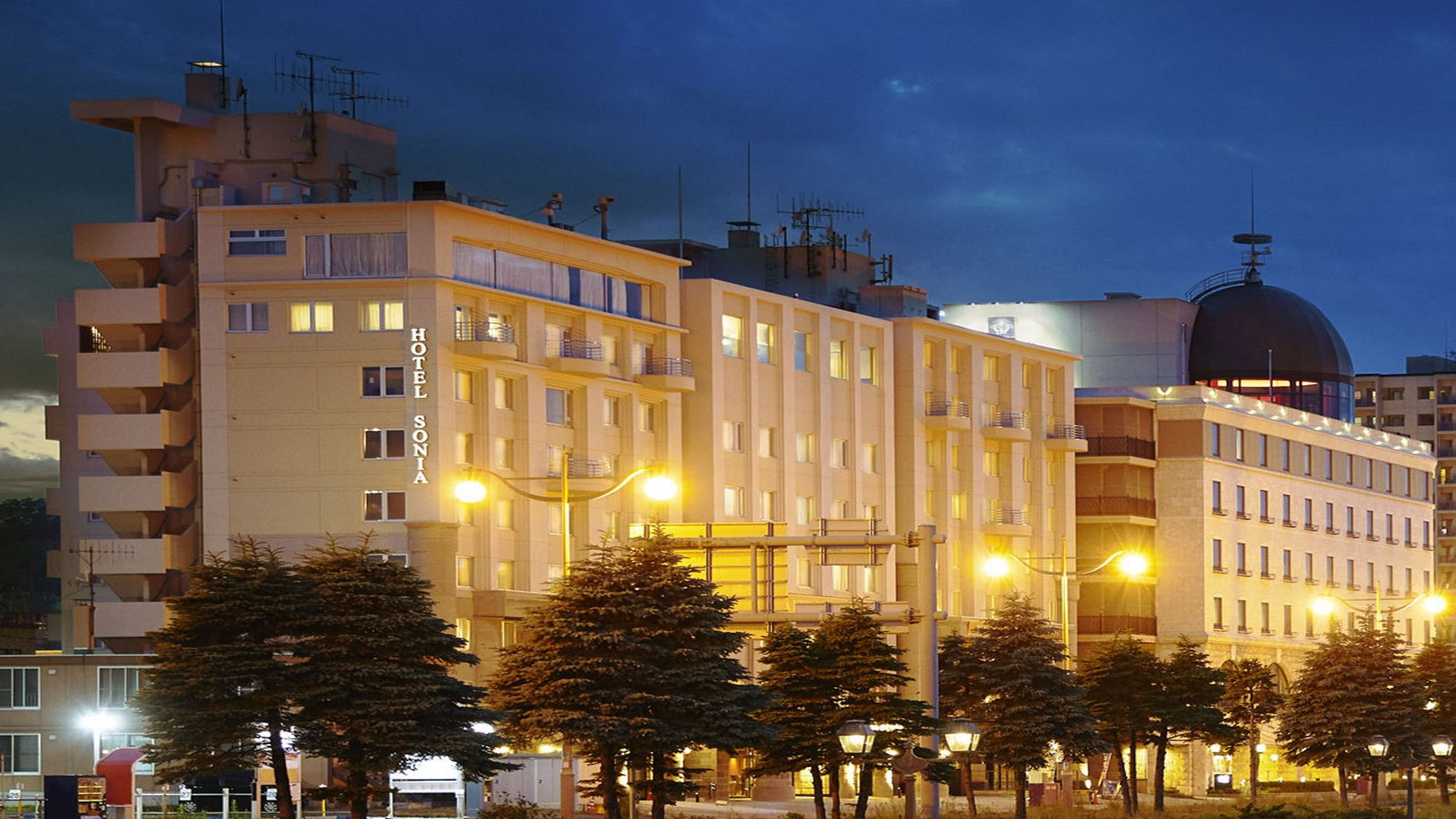 Hotel Sonia Otaruホテルソニア小樽
Hotel Sonia Otaruホテルソニア小樽- Address 1-4-20 Ironai, Otaru-shi, Hokkaido View Map
- Original source: Rakuten Travel
-
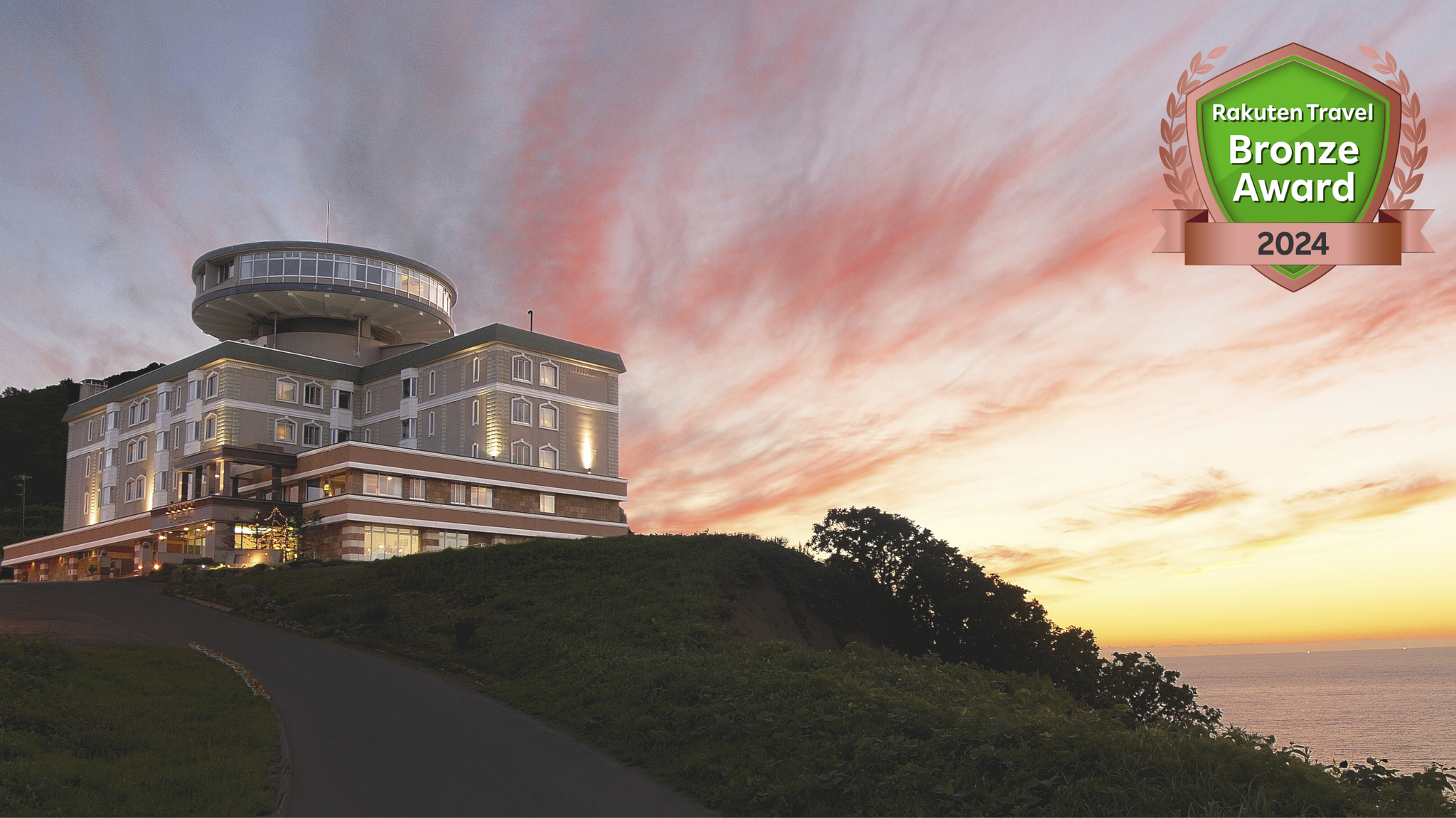 Hotel Neuschloss Otaruホテルノイシュロス小樽
Hotel Neuschloss Otaruホテルノイシュロス小樽- Address 3-282 Shukutsu, Otaru-shi, Hokkaido View Map
- Original source: Rakuten Travel
-
Cape Kamui神威岬
- Address Kozakicho, Shakotan, Shakotan District, Hokkaido, 046-0321
4. Lake Shikotsu: A fantasy-like lake of vibrant hues

Shakotan's sea is not the only place with a strong association with the color blue. To the southwestern part of Hokkaido is the scenic Lake Shikotsu inside Shikotsu-Toya National Park.
The cerulean shade that tinges the lake's waters is so unique, it is often referred to as Shikotsuko Blue!
Despite its secluded location surrounded by tall mountains such as Mount Eniwa, the lake remains very accessible to visitors. It takes about 55 minutes to come here by bus from Shin-Chitose Airport, or 50 minutes by car.

The striking blue hues of the lake can be attributed to the water's high transparency. Lake Shikotsu is a caldera lake that formed about 40,000 years ago due to volcanic activity. The lake has a depth of 363 meters (about 1,190 feet), which means it's the second deepest lake in Japan!
There is very little nutrient content in the water, making it difficult for organisms such as plankton to grow and survive well. This results in water that is clear and glitters like blue crystals when sunlight falls on it.
At Lake Shikotsu, there are countless nature-based activities available for visitors to try out. Because the lake seldom freezes over, water sports can usually be enjoyed all the way into winter!
The best period to admire Lake Shikotsu's beautiful blue water, however, is doubtlessly summer. As you glide through the lake surface in a canoe or learn to do some diving, you'll catch sight of fallen trees at the bottom of the lake and rocky surfaces peculiar to caldera lakes through the amazingly clear water.
While taking part in diving activities, you may even have the good fortune of swimming alongside some of the kokanee fish here, affectionately known by the locals as "Chippu" fish. All in all, there's much excitement to be had at Lake Shikotsu during the lively season of summer!
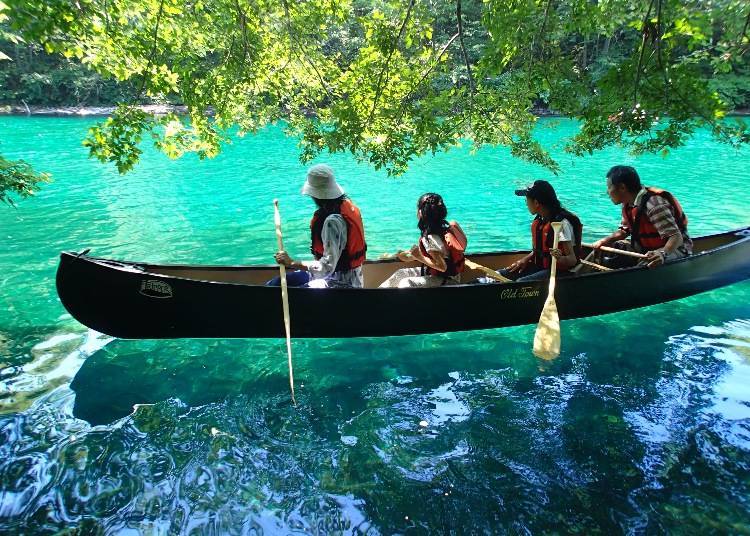
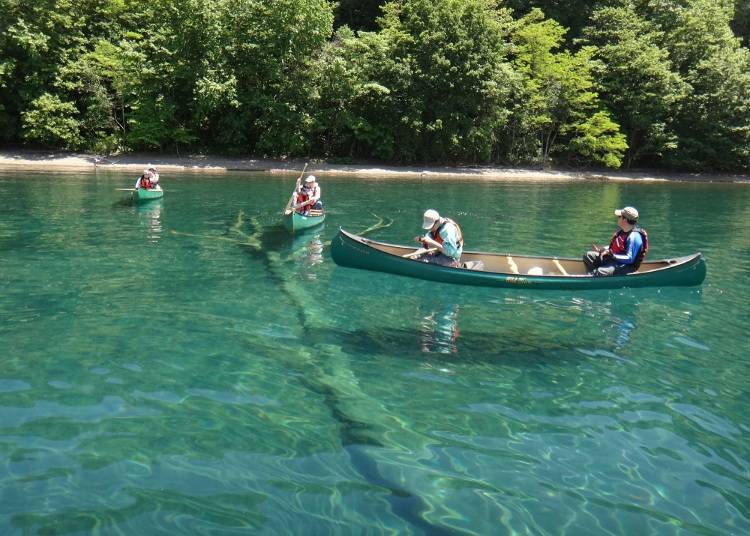
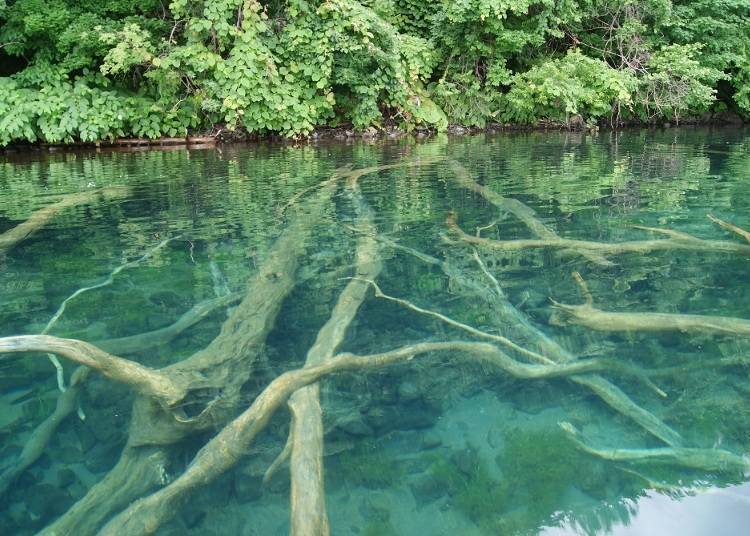
To enjoy the sights available at Lake Shikotsu at leisure, consider taking an excursion ship where you can get a clear look at what's going on underwater without having to dive in yourself.
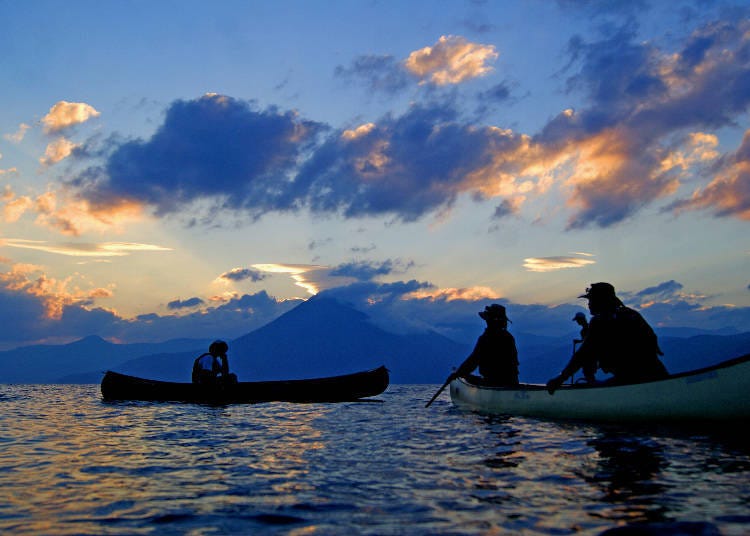
Shikotsuko Blue has a different look depending on the time of the day as well. For example, the colors here change dramatically at around sunset, and the atmosphere turns almost fantastical compared to daytime.
There's also a hot spring inn right at Lake Shikotsu, where visitors can view this changing scenery at leisure and in comfort. Don't forget to have some fresh-caught Chippu fish to complete the Lake Shikotsu experience!
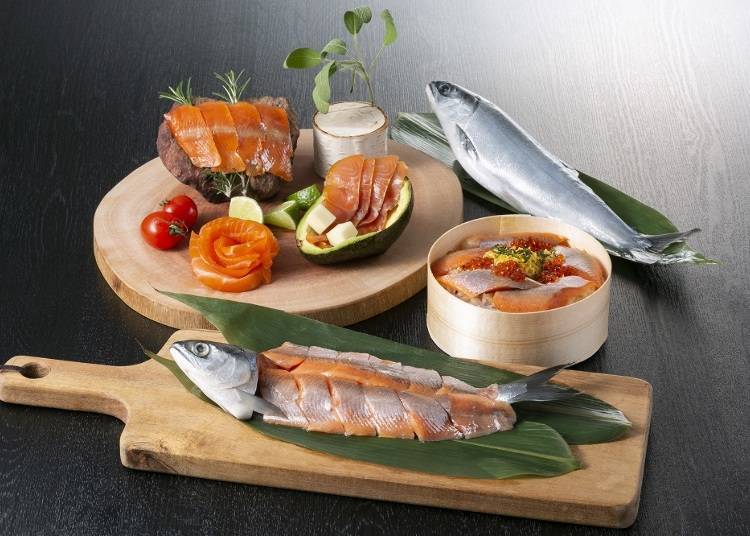
For more information on the best way to tour Lake Shikotsu, check out the official website maintained by the Lake Shikotsu Management Council, which is available in Japanese, English, and Traditional Chinese.
-

-
Address
Shikotsukoonsen, Chitose-shi, Hokkaido, 066-0281
View Map -
Nearest Station
Chitose Station (Chitose Line)
44 minutes on foot
- Phone Number 0123-25-2404
-
Address
Shikotsukoonsen, Chitose-shi, Hokkaido, 066-0281
5. Lavender Fields of Furano: The epitome of picture-perfect!
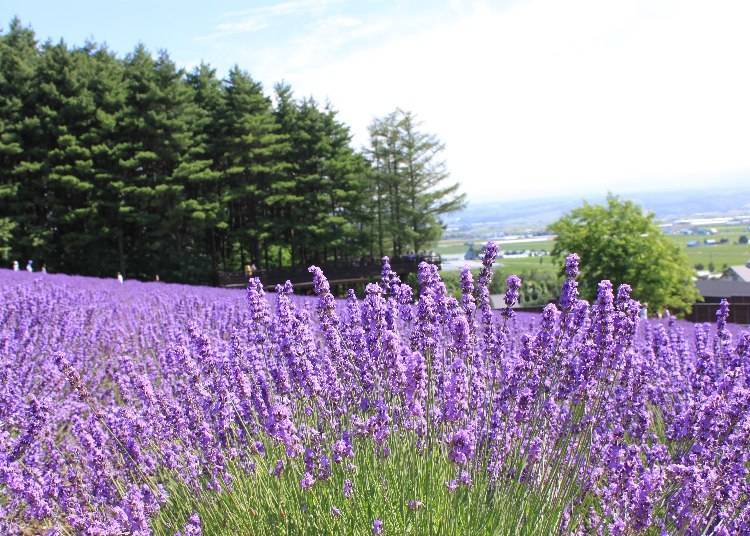
Summer in Hokkaido is the season of flowers, and here are a couple of large-scale flower fields you can visit during your time here.
The lavender fields of Furano, an area located right in the middle of Hokkaido, is perhaps one of the most well-known scenes people have come to associate a typical Hokkaido summer with.
Although lavender is native to France, they were brought over to Hokkaido for cultivation because of how much of a good fit the climate of Hokkaido was for them. The flower fields have continued to bloom beautifully year after year since their introduction.
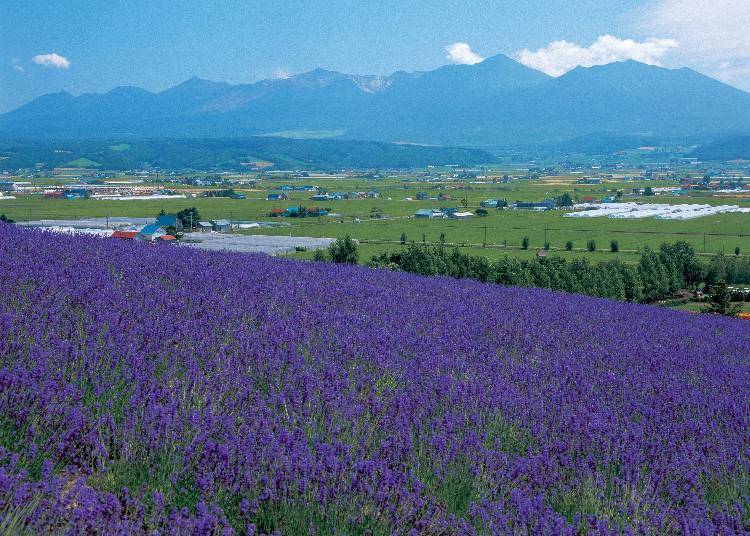
Farm Tomita
One of the more famous lavender viewing spots in the area is Farm Tomita. The farm is a 25-minute walk or 5-minute drive from Nakafurano Station on the JR Lines.
There are several fantastic flower fields here to visit, such as the Traditional Lavender Field, which is covered from slope to slope with the pretty purple blooms; the Forest Lavender Field that is surrounded by trees; or Sakiwai Field, where you can get to see many different lavender species.
If you only have time for one field, make it the Traditional Lavender Field! This is a great spot to take photos of the lavender, Furano Basin, and the Tokachi Mountain Range all in one shot! Staff on the farm are able to speak Japanese and English.
-

-
Address
15, Kisenkita, Nakafurano-cho, Hokkaido, 071-0704
View Map -
Nearest Station
Naka-Furano Station (Furano Line)
- Phone Number 0167-39-3939
-
Address
15, Kisenkita, Nakafurano-cho, Hokkaido, 071-0704

Flower Land Kamifurano
A short 10-minute drive away from Kamifurano Station on the JR Lines is Flower Land Kamifurano, a 15-hectare wide flower field that stands against the backdrop of the majestic Tokachi Mountain Range.
Besides lavender, visitors can also enjoy the sight of snapdragons and scarlet sages in full bloom during July, and they come together to make an indescribably pretty picture.
Visitors can make use of the tractor-bus service here to move around the large premises and admire the flowers without rushing. Signage is also available in Japanese, English, and Chinese for the convenience of all.
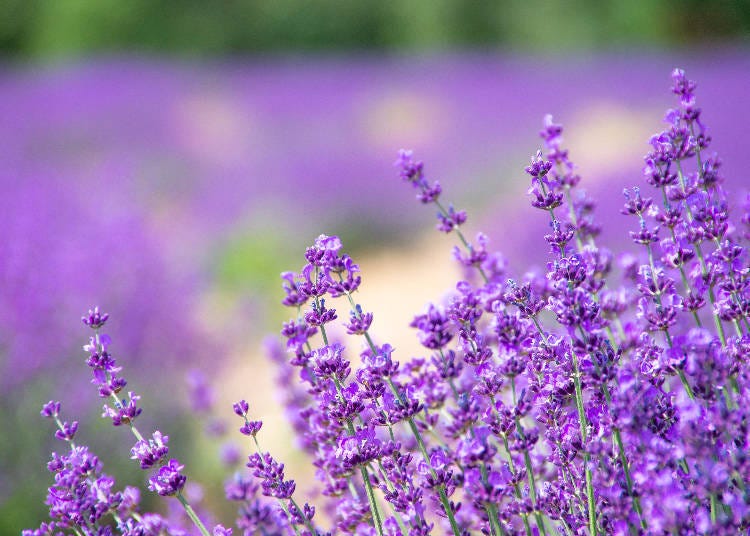
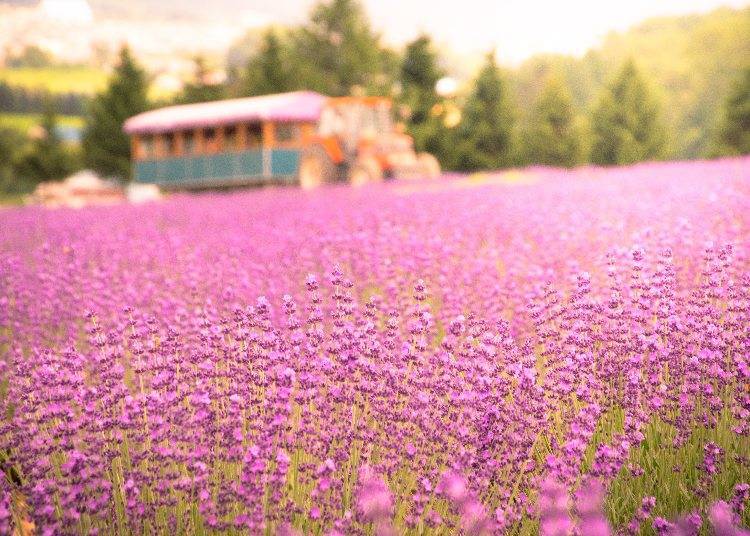
-

-
Address
27, Nishi-5-senkita, Kamifurano-cho, Sorachi-gun, Hokkaido, 071-0505
View Map -
Nearest Station
Furano Station (Nemuro Main Line / Furano Line)
8 minutes by car
- Phone Number 0167-45-9480
-
Address
27, Nishi-5-senkita, Kamifurano-cho, Sorachi-gun, Hokkaido, 071-0505
Other places in the Furano area worth visiting are places such as Torinuma Park that can be found on the outskirts of Furano City. The park is home to a swamp with such clear water that you can see right through to the bottom.
As you can probably guess, this interesting swamp has recently gained popularity as a great photo spot!
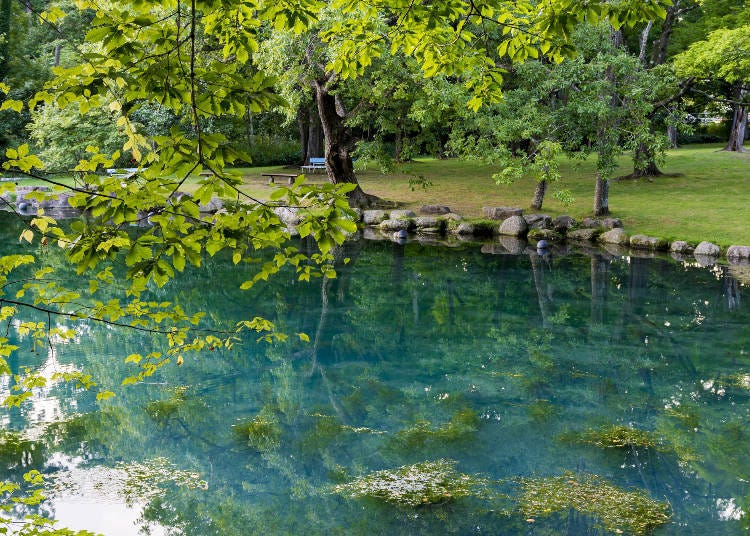
We can't forget about the food, of course, and the one delicacy you have to try out here during summer is the Furano melon! Furano is one of the top melon-producing regions in Hokkaido. The best time to try out the sweet and juicy fruits here is between May and early October, when they will be at their peak ripeness.
Recommended hotels in Furano
-
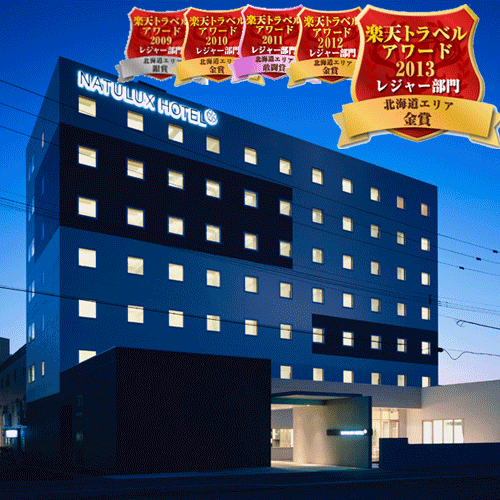 Furano Natulux HotelFURANO NATULUX HOTEL(富良野 ナチュラクス ホテル)
Furano Natulux HotelFURANO NATULUX HOTEL(富良野 ナチュラクス ホテル)- Address 1-35 Asahimachi, Furano-shi, Hokkaido View Map
- Original source: Rakuten Travel
-
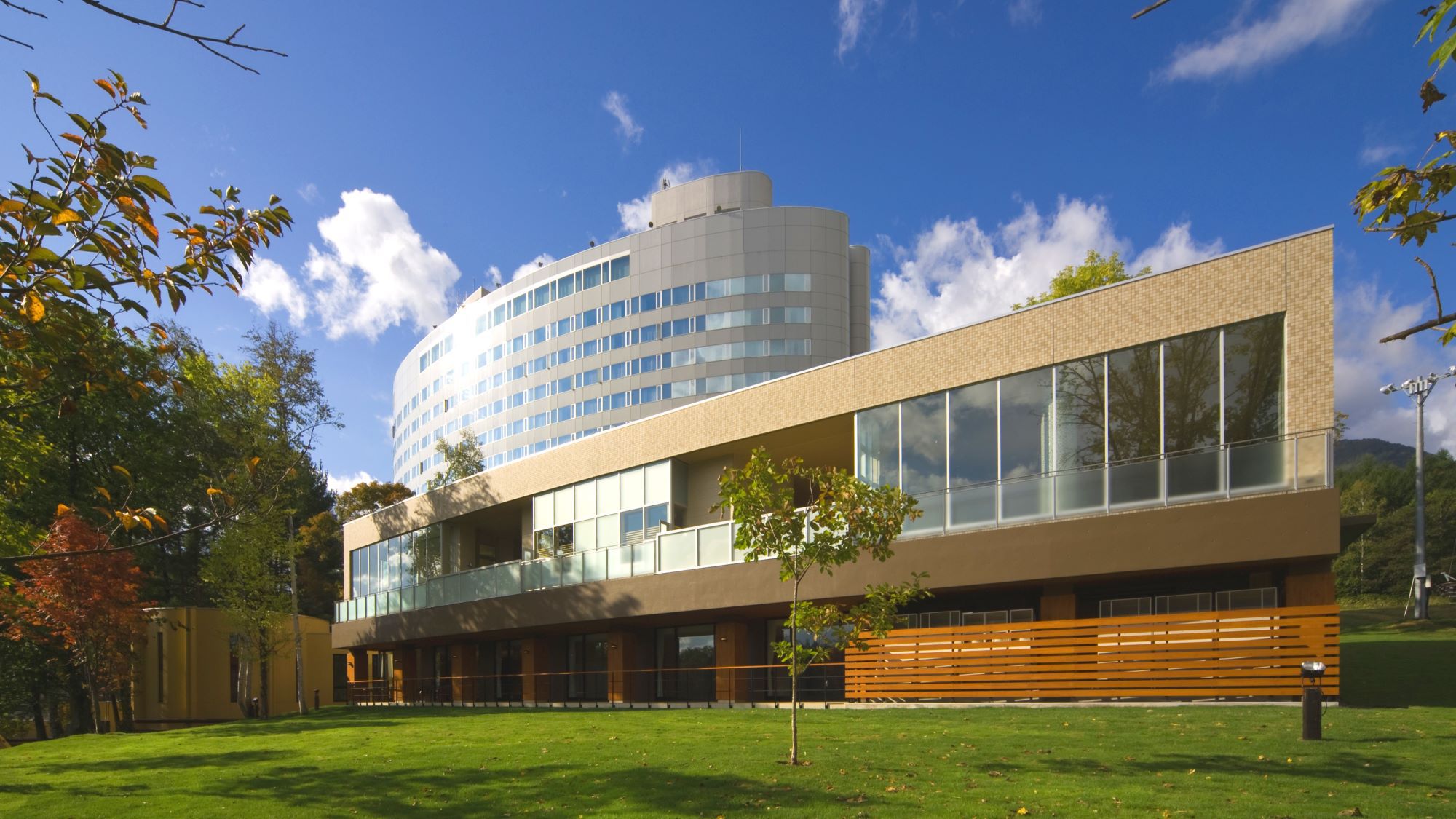 Shin Furano Prince Hotel新富良野プリンスホテル
Shin Furano Prince Hotel新富良野プリンスホテル- Address Nakagoryo, Furano-shi, Hokkaido View Map
- Original source: Rakuten Travel
-
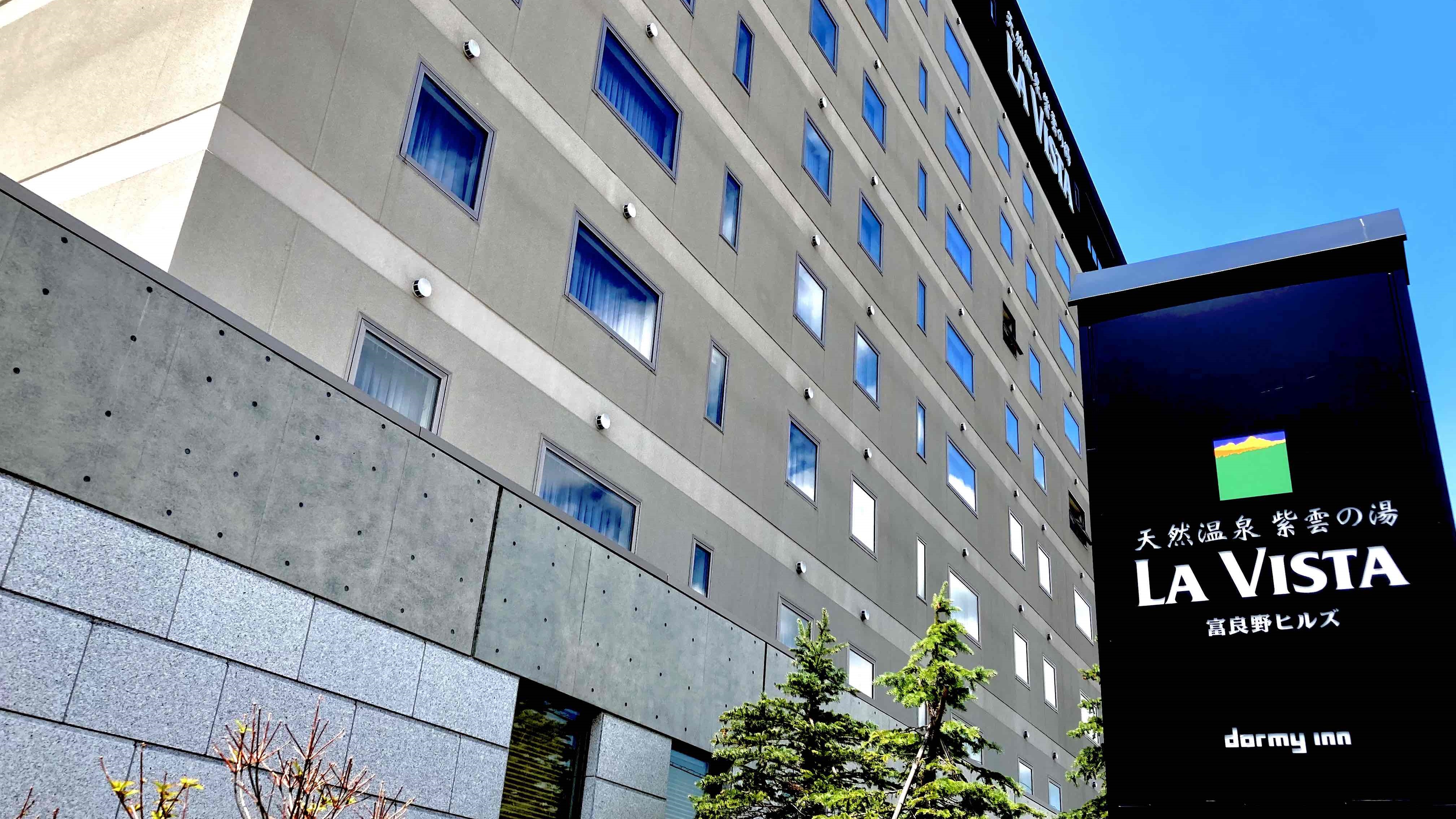 La Vista Furano Hills天然温泉 紫雲の湯 ラビスタ富良野ヒルズ(ドーミーイン・御宿野乃 ホテルズグループ)
La Vista Furano Hills天然温泉 紫雲の湯 ラビスタ富良野ヒルズ(ドーミーイン・御宿野乃 ホテルズグループ)- Address 5-14 Asahimachi, Furano-shi, Hokkaido View Map
- Original source: Rakuten Travel
6. Hokuryu Sunflower Village: Slopes upon slopes of cheerful yellow!
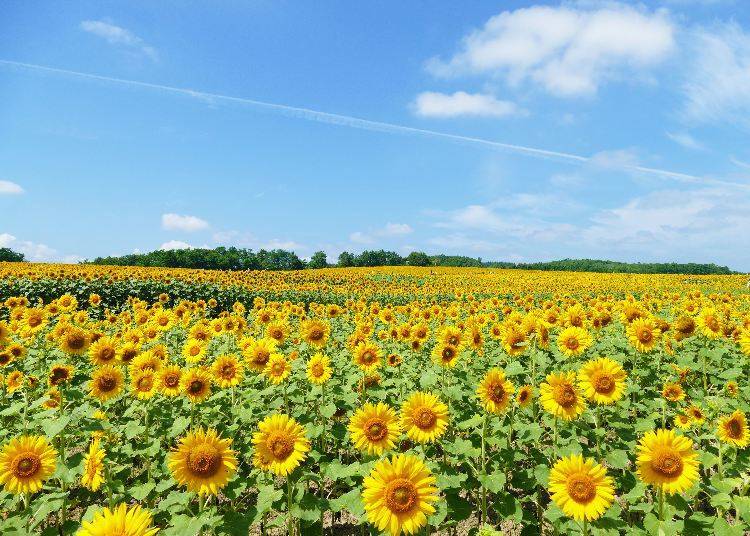
To the northwestern part of Hokkaido is Hokuryu, a town about a 2-hour drive from Sapporo. This place is home to the Hokuryu Sunflower Village - the largest sunflower field in Japan!
To get to the village by public transport, take a bus from Takikawa Station on the JR Lines. The journey should take about 40 minutes. You may also take a direct express bus from Sapporo Station's bus terminal if you like, and get off at the Hokuryuchugakkomae (Himawari no Sato) bus stop. The bus ride should take about two hours in this instance.

On average, Hokuryu Sunflower Village is visited by about 300,000 people every year.
These visitors make the long trip in hopes of catching a glimpse of some of the interesting species of sunflowers planted in this large field of about 23 hectares, such as the natsurinzo or hybrid sunflowers.
All in all, there are more than two million of these brightly colored blossoms for visitors to look at during the flowering season between July and August!
The flowers are gorgeous when they are in full bloom during early August, and the awe-inspiring scene has captured the imaginations and uplifted the spirits of many a visitor.
When blooming season is underway, the town holds a Hokuryu Sunflower Festival that features plenty of interesting installations and activities, such as a massive sunflower maze and a special exhibition corner called "Sunflowers of the World" where about 30 different species of sunflowers from around the world are made available for viewing.
The observatory deck in the village is not currently in use due to old age and deterioration. Whatever you do, please don't attempt to climb it!
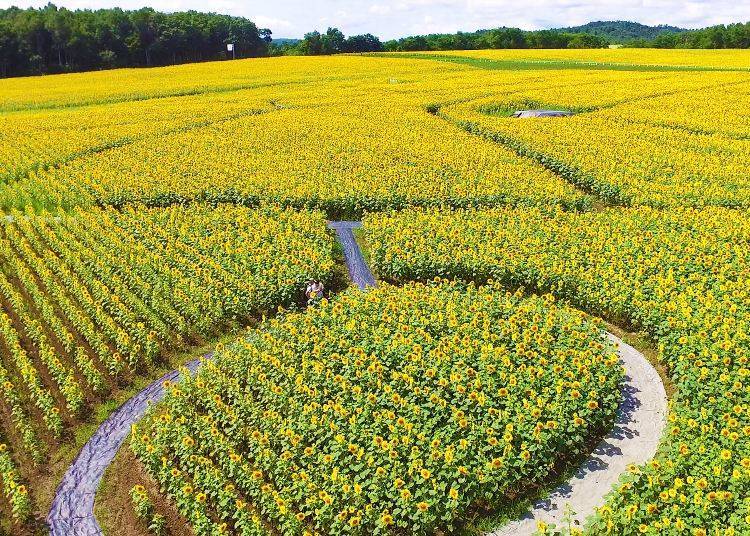
About a 4-minute drive from the sunflower village is the Roadside Station Sunflower Hokuryu, where you can find accommodations, hot springs, and other useful facilities.
The "Sunflower Soft Serve Ice-Cream" being sold here is topped with crunchy sunflower seeds, and we highly recommend trying it out to enjoy the region's local flavors fully!
Recommended hotels nearby
-
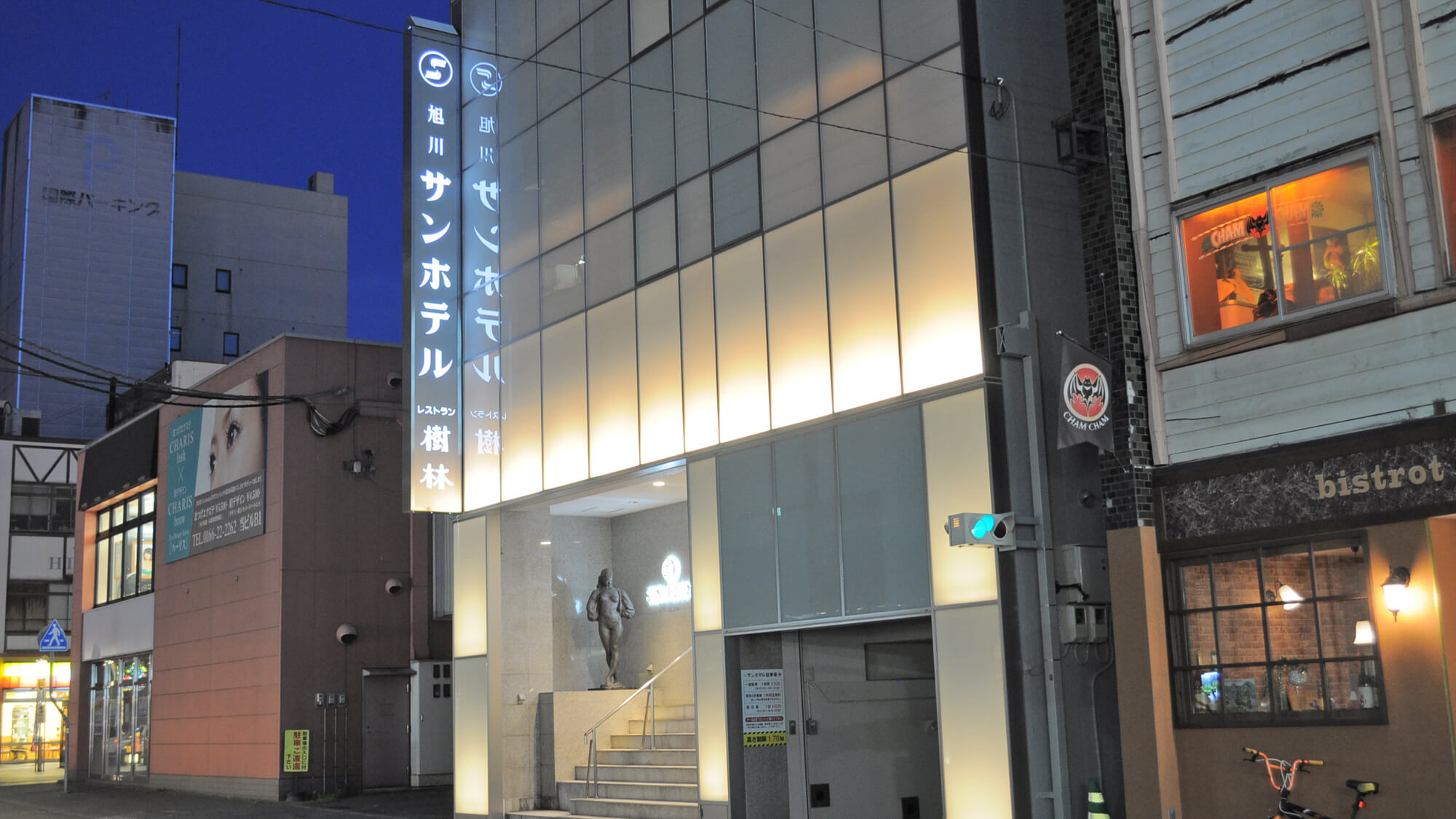 Asahikawa Sun Hotel旭川サンホテル
Asahikawa Sun Hotel旭川サンホテル- Address 7-8 Nijodori, Asahikawa-shi, Hokkaido View Map
- Original source: Rakuten Travel
-
Hokuryu Sunflower Village北竜町ひまわりの里
- Address 143-2, Itaya, Uryu Gun Hokuryu Cho, Hokkaido, 078-2511
- Phone Number 0164-34-2111
・Hours: Open 24 hours
・Admission: Free
・Closed: Open daily
7. The Gardens of Tokachi: Art in formations
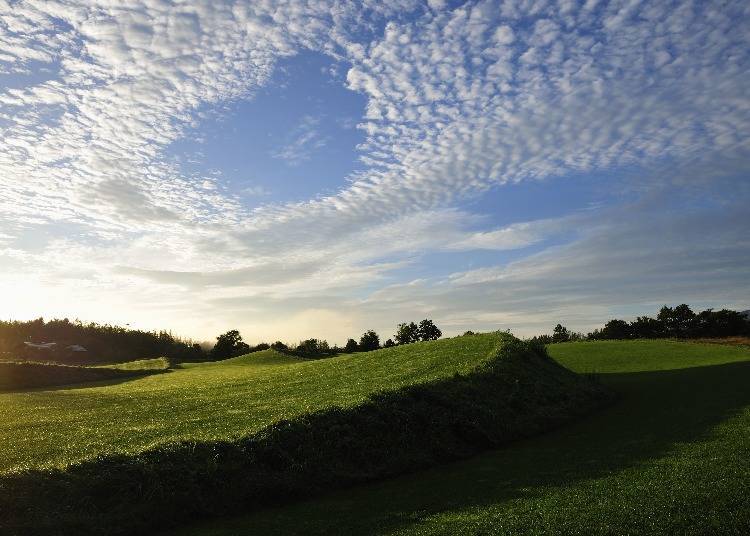
Our last entry is a scenic spot specially designed not by nature but by human hands. All over Hokkaido, there are plenty of beautiful gardens that show off plants and flowers peculiar to its northern climate, and many of these gardens can be found in Tokachi, an area that is situated in the southeastern region of the prefecture.
These gardens will be a treat for anyone looking to feast their eyes, especially for those interested in gardening and landscaping!
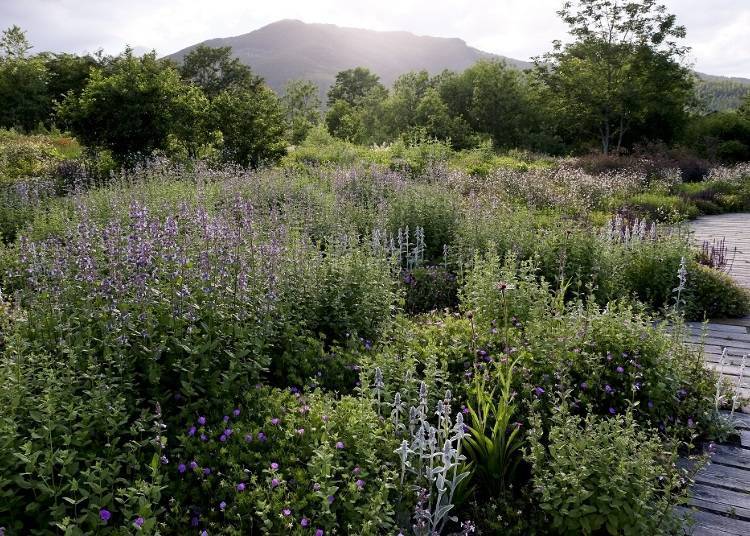
Tokachi Millennium Forest
Tokachi Millennium Forest was created to offset the carbon footprint of a local daily newspaper company, Tokachi Mainichi Shinbunsha.
The forest and two gardens inside, Earth Garden and Meadow Garden, had been carefully designed by famous British architect, Dan Pearson, and won the grand award in the 2012 SGD Awards for their sterling beauty. They are known around the world as the best gardens of the 21st century.
During summer, Earth Garden's wave-like lawns blend in harmoniously with the Hidaka Mountains in the background to conjure up an overwhelming sense of openness.
Meanwhile, Meadow Garden takes inspiration from Tokachi's nature and features a tasteful union of the region's lush greenery and lovely flowers. Tokachi Millennium Forest occupies an expansive area of about 400 hectares. There is a cafe on the premises where you can enjoy a spot of tea while taking a break from your scenic exploration.
It takes about 15 minutes by car to get to Tokachi Millennium Forest from Tokachi-Shimizu Station on the JR Lines.
-
Tokachi Millennium Forest十勝千年の森
- Address 10sen, Haobi, Kamikawa Gun Shimizu Cho, Hokkaido, 089-0356
- Phone Number 0156-63-3000
・Hours: April 24 – June 30 (9:30 a.m. – 5:00 p.m. *Last entry 4:30 p.m.); July 1 – August 31 (9:00 a.m. – 5:00 p.m. *Last entry 4:30 p.m.); September 1 – October 17 (9:30 a.m. – 4:00 p.m. *Last entry 3:30 p.m.)
・Admission: Adults (16 and above) 1,200 yen; Children (7 to 15) 600 yen; Minors (6 and below) free; Disability passbook holders 1,000 yen
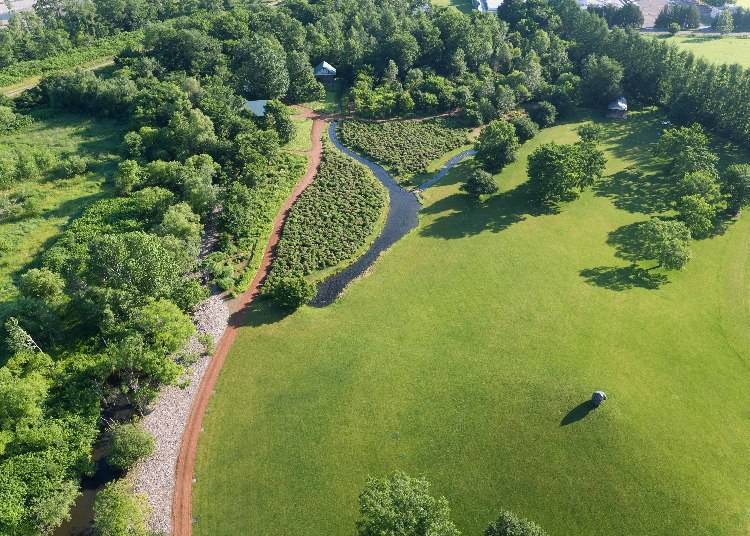
Rokka Forest
There's another lovely garden in Tokachi to visit, known as the Rokka Forest, which is maintained by Hokkaido's most well-known confectionery company, Rokkatei.
The garden itself is about a 40-minute drive from Obihiro Station on the JR Lines, and the concept behind it is a place where the Hokkaido flowers that appear on the packaging of Rokkatei pastries can come to life for all to enjoy.
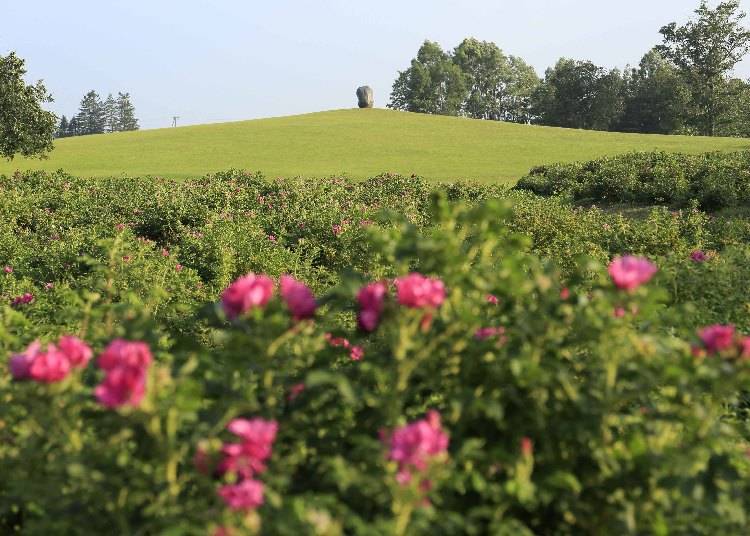
The garden covers an area of about 10 hectares. All manners of greenery can be found here, including seasonally blooming trees and flowers, though the garden is definitely at its most luxuriant during summer.
Walking through the tranquil forest, breathing in the clear air, and admiring the flowers appreciatively here can be quite therapeutic!
The interesting sculptures installed around the garden also allow visitors to see how nature and art can come together in a tastefully unobtrusive way.
Other facilities on garden grounds include a gallery exhibiting paintings of an artist with deep connections to Rokkatei and a shop and cafe that sells merchandise manufactured by the company.
These are all great places to drop by to learn more about the place and buy some souvenirs to remember this visit.
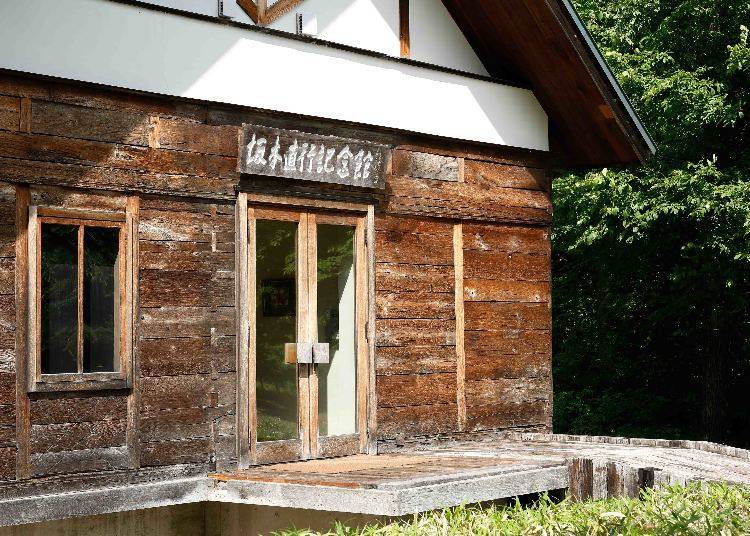
-

-
Address
Nakasatsunai Village, Kasai District, Hokkaido Tokiwa Nishi 3 Line 249-6, 089-1300
View Map -
Nearest Station
Obihiro Station (Nemuro Main Line)
- Phone Number 0155-63-1000
-
Address
Nakasatsunai Village, Kasai District, Hokkaido Tokiwa Nishi 3 Line 249-6, 089-1300
Other than the gardens mentioned above, the famous Shichiku Garden, Manabe Garden, and Tokachi Hills are other hotspots to consider visiting as they each have unique characteristics that set them apart from each other.
And if you want to immerse yourself even further into Hokkaido's garden culture, plan to include the Hokkaido Garden Path into your itinerary! This is a 250-kilometer (about 155 miles) long route that connects eight of Hokkaido's most iconic gardens in Daisetsu, Furano, and Tokachi together in one convenient line for easy trip planning.
Do be reminded that admission fees and opening hours will differ from garden to garden, so please check the official websites for the latest information before heading down!
Recommended hotels nearby
-
 Tokachigawa Onsen Daiichi Hotel十勝川温泉第一ホテル 豊洲亭・豆陽亭
Tokachigawa Onsen Daiichi Hotel十勝川温泉第一ホテル 豊洲亭・豆陽亭- Address Tokachigawa Onsen Minami 12, Otofuke, Hokkaido View Map
- Original source: Booking.com
Vacancy search, reservation
-
from 20,507JPY 1room, 2adults
Check with our partner site as the latest rates, rate details, and guest room requirements may vary.
It's well-known among travelers that Hokkaido summers are milder and less humid than summers on Honshu, making the usually torrid season almost pleasant to go around exploring in.
Together with the region's great scenery, hidden beauty spots, lush nature, and the occasional fantasy-like view or two, Hokkaido makes it easy for virtually anyone - including you! - to find something to their liking here!
Text by: Minna no Kotobasha. English translation by: Huimin Pan.
*Information in this article is accurate as of June 2021. Check the official website for latest information.
Minna no Kotoba Sha is a production company founded by an editor with extensive experience in editing local magazines in Sapporo. For over 20 years, our team has conducted research and written articles across Hokkaido, with Sapporo as our primary hub. Our diverse portfolio includes the production of various books such as travel guides, informational magazines, and collections showcasing the picturesque landscapes of Hokkaido. Comprised entirely of women, the team at Minna no Kotoba Sha boasts diverse interests, including a passion for travel, culinary delights, and alcoholic beverages. The scope of our communication efforts spans a wide range, covering everything from introducing notable restaurants to providing coverage of local events and sharing stories of leisure experiences.
- Area
- Category
*Prices and options mentioned are subject to change.
*Unless stated otherwise, all prices include tax.
Popular Tours & Activitiess
Recommended places for you
-
Appealing

Odori Park
Parks
Sapporo / Chitose
-
Appealing

Noboribetsu Onsen
Hot Springs (Onsen) & Bath Houses (Sento)
Noboribetsu / Lake Toya
-
Appealing

Otaru Canal
Rivers, Lakes & Canyons
Otaru
-
Appealing

Rukku and Uohei
Izakaya
Sapporo / Chitose
-
Appealing

Asahiyama Zoo
Zoos, Aquariums & Botanical Gardens
Asahikawa
-
Appealing

Sapporo Ramen Yokocho
Ramen
Sapporo / Chitose
-

BIGGEST SALE ALERT! SATUDORA Tax-Free Winter Sale: Stack Coupons for Massive Savings!
by: Guest Contributor
-
Ad

Explore Eastern Hokkaido from Tancho Kushiro Airport: Your Gateway to Grand Nature
-

Expert-Recommended: 9 Hakodate Hotels Serving Up the Best Breakfasts in Town
by: Nobuka Kawashima
-

7 Iconic Hokkaido locations that will make your Instagram shine
by: Himanshi Shah
-
Ad

Smart Ways to Avoid Crowds and Enjoy a Safe, Comfortable Trip to Otaru.
-

Beyond Hakodate and Matsumae: Enjoy the Hidden Gems of Hokkaido’s Donan Area
-

6 Most Scenic Spots Around Mount Yotei, Hokkaido: Gorgeous Sunflowers & More!
-

7 Reasons Every Country Should Have a Wonderland Like Tomamu Ice Village
-

Top 9 Gorgeous Hokkaido Flowers Spots (Best Between June and August)
-

Unkai Terrace & More: Where to Enjoy the Extraordinary Seas of Clouds in Hokkaido
-

Complete Guide to Buying Japanese Medicine in Japan: Phrases and Vocabulary You Need to Know
-

Day Trip from Sapporo to Otaru: Access, Itinerary & Food Guide
by: Guest Contributor
- #best sushi hokkaido
- #things to do hokkaido
- #best ramen sapporo
- #what to bring to japan
- #new years in tokyo
- #what to buy in ameyoko
- #japanese nail trends
- #what to do in odaiba
- #onsen tattoo friendly tokyo
- #daiso
- #best sweets otaru
- #japanese fashion culture
- #best nature furano
- #japanese convenience store snacks
- #best japanese soft drinks















